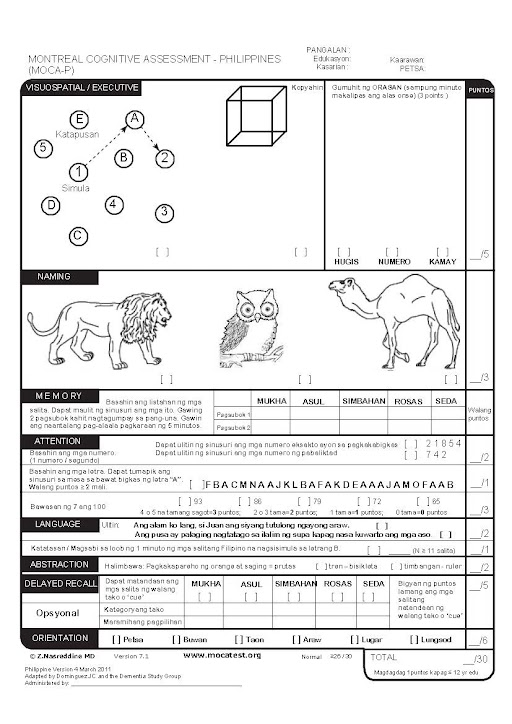HeaRTNovation
MONTREAL COGNITIVE ASSESSMENT – PHILIPPINES (MoCA-P)
Technology Generator
Institute of Neurosciences, St. Luke’s Medical Center
Project Leader: Dr. Jacqueline C. Dominguez
The Problem
Alzheimer’s disease is a progressive neurological disorder that slowly deteriorates memory and thinking skills, and eventually affects carrying out simple tasks. It is an ongoing global public health issue, with the bulk of affected individuals residing in Asia’s emerging nations, more so in the Philippines, where cognitive decline is mostly attributed to natural aging. Hence, diagnosing dementia in its early stages presents a unique problem.
There are existing cognitive tests developed to diagnose dementia. However, the majority are produced in the English language and are based on western culture, which influences the applicability of these tests in Asian countries. In the Philippines, the Mini-Mental Status Examination (MMSE-P) is developed to assess the mental status specific for Filipinos. Although widely used, the MMSE does not detect minor cognitive impairment. Hence, a more sensitive screening tool is required to diagnose mild dementia.
The Solution
 The St. Luke’s Medical Center – Institute of Neurosciences, through the funding support of the DOST-Philippine Council for Health Research and Development (DOST-PCHRD), has conducted a cross-sectional study to determine the diagnostic validity of the Philippine version of the Montreal Cognitive Assessment – Philippines (MoCA-P).
The St. Luke’s Medical Center – Institute of Neurosciences, through the funding support of the DOST-Philippine Council for Health Research and Development (DOST-PCHRD), has conducted a cross-sectional study to determine the diagnostic validity of the Philippine version of the Montreal Cognitive Assessment – Philippines (MoCA-P).
MoCA-P is an instrument designed to detect mild cognitive impairment in those with normal MMSE scores. It contains items that measure executive functions, making it beneficial for assessing Vascular Cognitive Impairment (VCI) and in measuring the cognitive functioning of Parkinson’s Disease patients.
Memory complaints are widespread among the elderly in healthcare settings, especially among individuals without Alzheimer’s disease. Such issues pose difficulties for doctors in diagnosing. This positions MOCA-P as an ideal cognitive screening instrument because it is brief and easy to administer, patient-friendly, and independent of education, culture, and language factors that can affect performance and comprehensibility in its coverage of cognitive domains of interest. The validation study demonstrates that MoCA-P has more items that assess attention, executive function, and visuospatial skills, making it more effective at diagnosing mild impairment.
Project Team
The Montreal Cognitive Assessment was created by Dr. Ziad Nasreddine of the Université de Sherbrooke, Québec, Canada.
The adaptation and validation study of the Montreal Cognitive Assessment – Philippines (MoCA-P) in early detection of Mild Alzheimer’s Disease is led by Dr. Jacqueline C. Dominguez at the Institute for Neurosciences of St. Luke’s Medical Center.
The Montreal Cognitive Assessment was created by Dr. Ziad Nasreddine. The validation study of the Montreal Cognitive Assessment – Philippines (MoCA-P) in early detection of Alzheimer’s Disease is led by Dr. Jacqueline C. Dominguez, supported by the PCHRD.
Product Development Stage
Montreal Cognitive Assessment – Philippines (MoCA-P) is at Technology Readiness Level (TRL) 9. This dementia screening tool is being used by the Dementia Society of the Philippines for early detection of Alzheimer’s disease. Hospitals and healthcare institutions all over the country, both public and private, are encouraged to adopt the MoCA-P in early detection of mild cognitive impairment.
Contact Person
Dr. Jacqueline C. Dominguez
Institute of Neurosciences
St. Luke’s Medical Center – Quezon City
jacdominguez@yahoo.com




